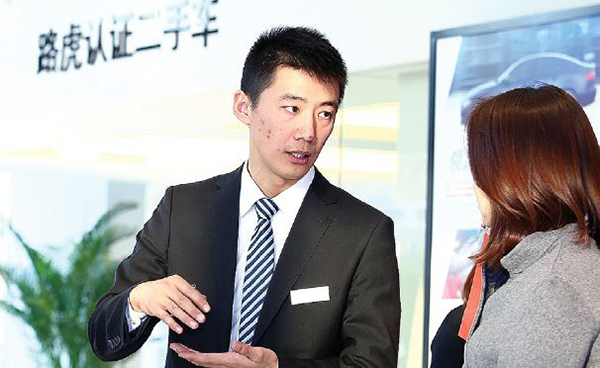Automakers derive new ways to fuel secondhand sector
 |
|
A JLR salesman explains the automaker's used car program to a potential customer at a 4s store in Beijing on Tuesday. [Photo provided to China Daily] |
Premium carmakers are tapping into China's underdeveloped and disorganized used car market with answers to people's top concerns.
China sold 8.27 million used cars from January to October this year, less than 40 percent of new car sales in the same period. In developed markets like the US, used car sales are usually more than double those of new cars.
Unclear sources of cars and lack of aftersale services are believed to be major impediments but many carmakers, especially premium ones, are trying to dispel customers' worries.
Jaguar Land Rover is the latest premium carmaker to offer a used car program in the Chinese market, and the achievements are encouraging.
Vincent Yan, vice-president of the automaker's used car program in China, said JLR set a target of selling 2,400 units via the program, called Approved, in the 2016-2017 financial year. Since rolling out the program in January, the program has already reached two thirds of its sales goal.
"Our survey shows that instead of prices, quality and aftersale services are top concerns for those who want to purchase a used car, and our program solves these problems," said Yan, who explained that used cars in the program have to pass more than 160 tests and come with a two-year guarantee.
Car dealers are enthusiastic as the sector is becoming a new source of revenue.
When the JLR program started in January, it involved seven dealerships.
The figure is now 41 and another five are expected to join by the end of the year.
Gary Wells, head of JLR's global used car program, said the program offers solutions for existing customers who want to change cars and at the same time attracts new buyers.
BMW started its used car program in 2005 and has recently upgraded it now that "all new cars will finally become used cars".
The company says that 100,000 used cars have been traded through the program over the past five years, with an annual growth rate of almost 30 percent.
In the first three quarters of 2016, 36,000 used BMW and MINI cars were sold in China through its used car program, around 10 percent of new car sales in the same period.
Choi Ne-hyun, head of used car development at BMW Brilliance Automotive Ltd, said China has huge potential, but it is currently lagging behind other markets.
Almost there
Despite carmakers' efforts, it may still take a while for the used car market as a whole to prosper.
The China Automobile Dealers Association estimates that sales of used cars this year may reach 10 million units. The organization had expected the figure to reach at least 11 million when the State Council introduced a series of stimulus policies for the sector in March, but later scaled back its estimate.
An eight-article guideline demanded that local governments lift any limitations on the flow of used vehicles between regions by the end of May.
Yet the policy did not work out. Only 133 cities had lifted the ban by Aug 1, less than half of those with restrictive measures.
China has 172 million cars, but the ban has curbed the free flow of used cars, resulting in insufficient supply.
Lang Xuehong, a deputy CADA secretary-general, said used car dealers complain about local authorities' failure to implement the central government's policies.
Industry insiders say local authorities failed to lift the ban because used cars usually have higher emissions and contribute less to a local economy.
CADA Secretary-General Xiao Zhengsan called for the removal of the ban as soon as possible, saying that it is already affecting used car sales and may damage the sector further if it is further postponed.























